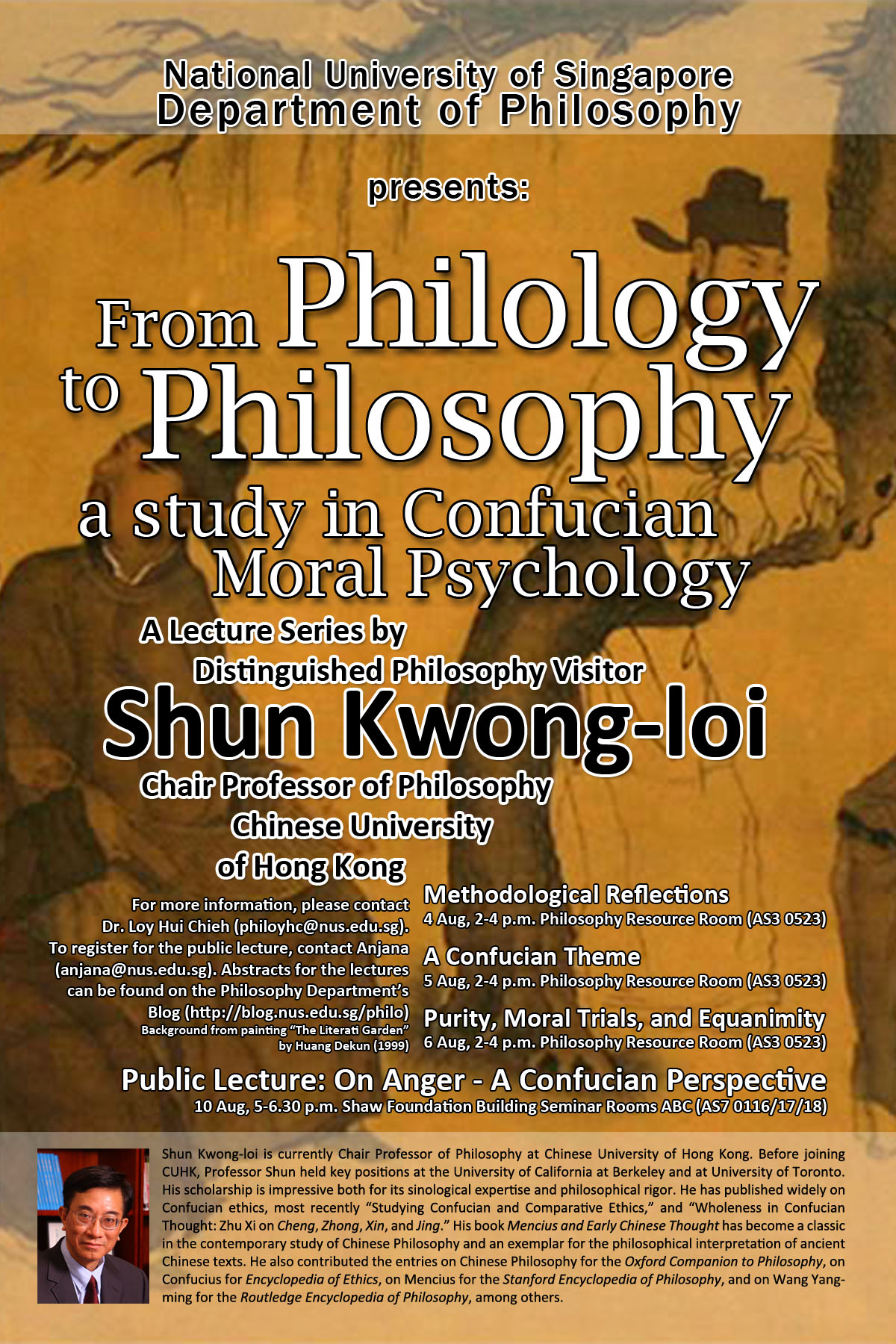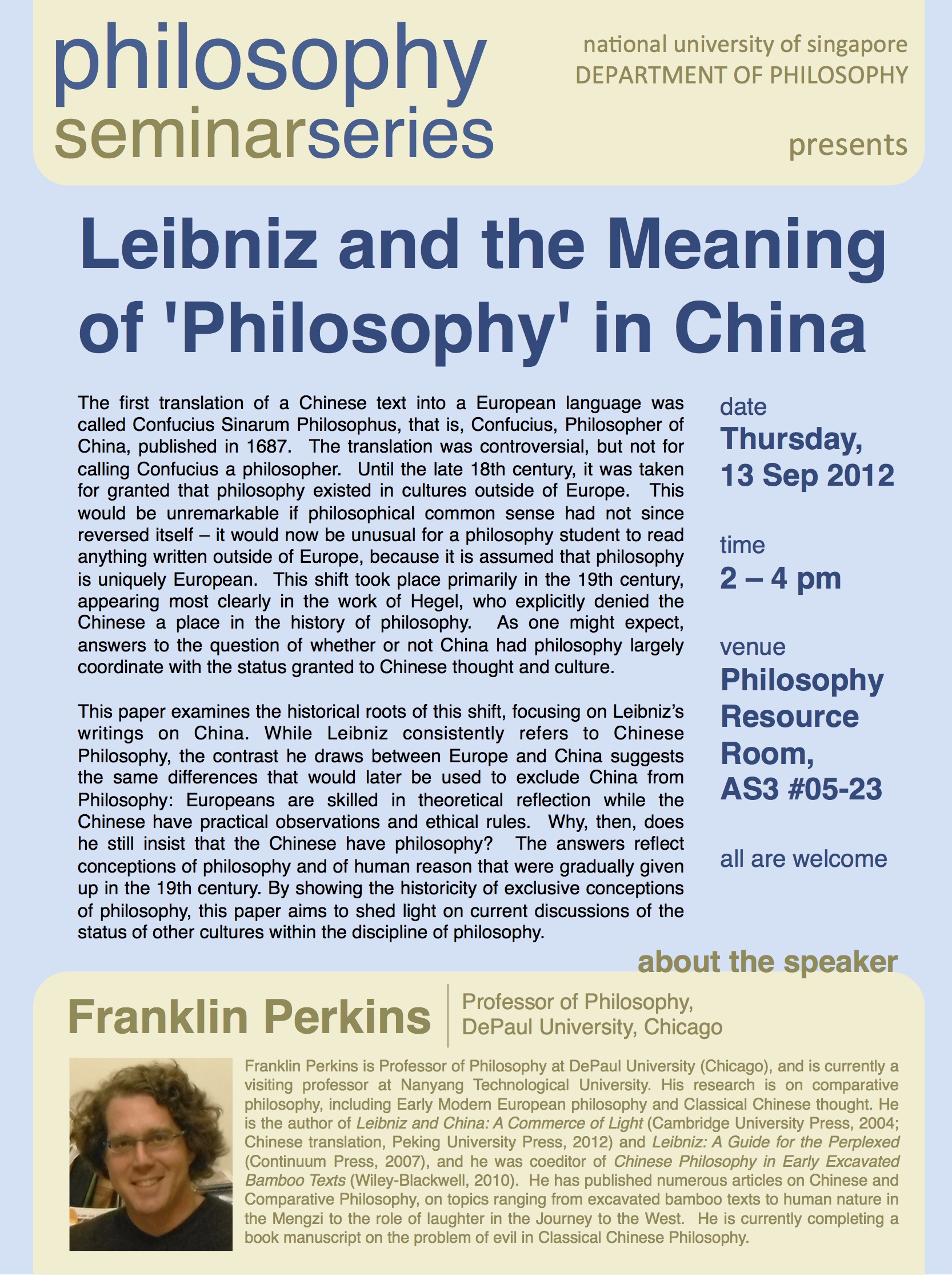A Series of lectures by Distinguished Philosophy Visitor Professor Shun Kwong-loi, Chair Professor of Philosophy and Sin Wai Kin Professor of Chinese Culture, Chinese University of Hong Kong.
Session 1: Methodological Reflections (AS3 0523, 4 Aug, 2-4 p.m.) (.pdf)
Session 2: A Confucian Theme (AS3 0523, 5 Aug, 2-4 p.m.)
Session 3: Purity, Moral Trials, and Equanimity (AS3 0523, 6 Aug, 2-4 p.m.) (.pdf)
Public Lecture: On Anger – A Confucian Perspective (AS7 0116/17/18, 10 Aug, 5-6.30 p.m.) (.pdf)
 The series of four lectures present a certain methodological approach to the philosophical study of Chinese thought, illustrated by a number of Confucian ideas related to the Confucian understanding of propriety (yi 義). The first lecture presents the methodological approach, and distinguishes between three different though related goals in the study of Confucian ethical thought. The first seeks to approximate the ideas recorded in early texts through careful textual and historical analysis. The second aims at extracting the insights behind the texts that are of relevance to our own contemporary ethical experiences. The third attempts to build a systematic and reflective account on the basis of these insights that deepens our understanding of our own ethical life. The first task is primarily philological and focuses on the past, namely, on approximating the thinking of past Confucian thinkers. The third task is primarily philosophical and focuses on the present, namely, on building a reflective account of our ethical experiences that is of appeal to us nowadays. The second provides a transition from the philological to the philosophical, and involves our moving between the past and the present in an attempt to articulate the insights of past Confucian thinkers that are of present relevance.
The series of four lectures present a certain methodological approach to the philosophical study of Chinese thought, illustrated by a number of Confucian ideas related to the Confucian understanding of propriety (yi 義). The first lecture presents the methodological approach, and distinguishes between three different though related goals in the study of Confucian ethical thought. The first seeks to approximate the ideas recorded in early texts through careful textual and historical analysis. The second aims at extracting the insights behind the texts that are of relevance to our own contemporary ethical experiences. The third attempts to build a systematic and reflective account on the basis of these insights that deepens our understanding of our own ethical life. The first task is primarily philological and focuses on the past, namely, on approximating the thinking of past Confucian thinkers. The third task is primarily philosophical and focuses on the present, namely, on building a reflective account of our ethical experiences that is of appeal to us nowadays. The second provides a transition from the philological to the philosophical, and involves our moving between the past and the present in an attempt to articulate the insights of past Confucian thinkers that are of present relevance.
The first lecture of the series lays out this methodological approach, while the other three lectures illustrate the three tasks just described, using a number of Confucian ideas related to the Confucian understanding of propriety as the guiding theme. The second lecture provides a discussion of these ideas, including yi 義, ming 命, cheng 誠, xu 虛 and si 私, and analyses the way these concepts are understood in early and later Confucian thought . The third lecture builds on the second by drawing out the philosophical implications of the ideas discussed in the second lecture, focusing on the phenomena purity, moral trials, and equanimity. The fourth lecture builds on the third by providing a more in-depth and primarily philosophical discussion of ideas highlighted in the third lecture, using the phenomenon of anger as a focus for the discussion. Together, the four lectures illustrate a way of integrating philological and philosophical methods in the study of Chinese thought.
Public Lecture, 10 August, 5 to 6.30 p.m., FASS Seminar Room , AS7-01-16/17/18
On Anger – A Confucian Perspective
The lecture discusses the phenomenon of anger as viewed from a Confucian perspective. After introducing the phenomenon of anger, it describes the Confucian view of disgrace and self-regard, and discusses the implication of this view for the Confucian perspective on anger. This perspective explains why the notions of resentment and forgiveness do not play a prominent role in Confucian thought, and also provides a sense in which the Confucian attitude is ‘detached’ in a way that leads to a sense of invulnerability and equanimity.
For more information, please contact Dr. Loy Hui Chieh (philoyhc@nus.edu.sg). To register for the public lecture, please contact Anjana (anjana@nus.edu.sg).



 About the speaker: Michael Puett is the Walter C. Klein Professor of Chinese History in the Department of East Asian Languages and Civilizations at Harvard University. He is the author of
About the speaker: Michael Puett is the Walter C. Klein Professor of Chinese History in the Department of East Asian Languages and Civilizations at Harvard University. He is the author of 




